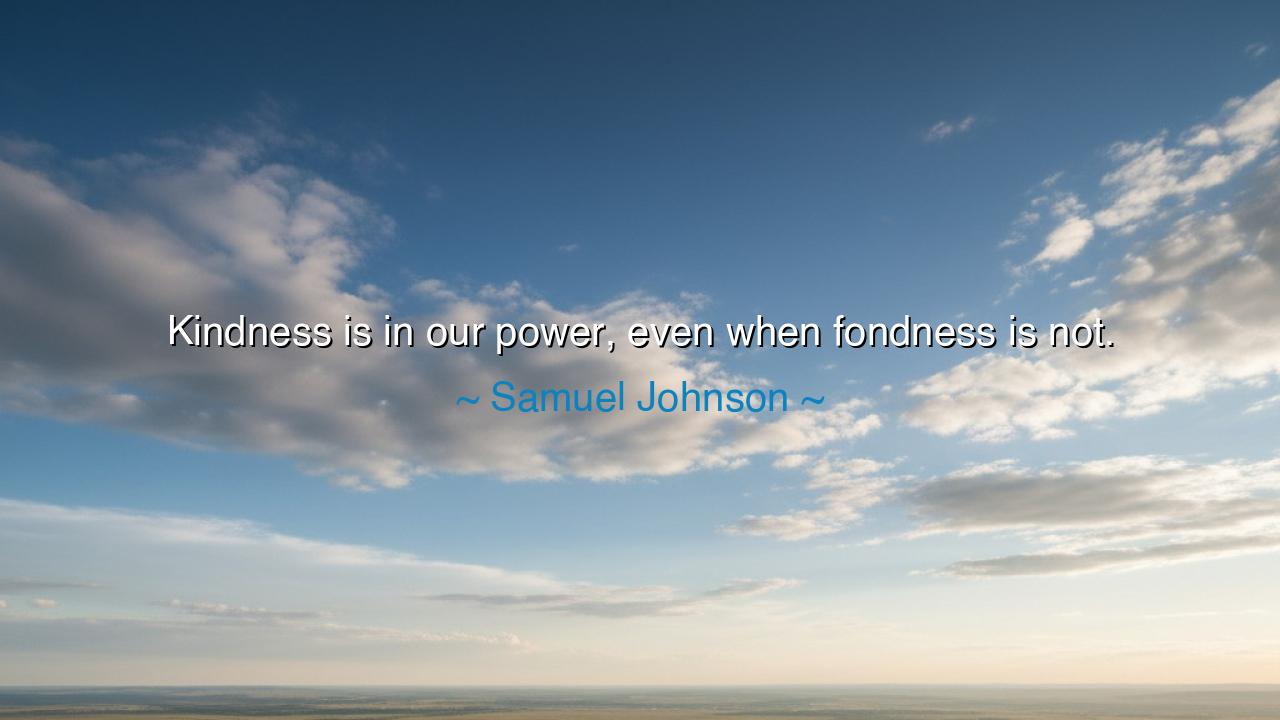
Kindness is in our power, even when fondness is not.






The English sage Samuel Johnson, who peered deeply into the hearts of men, once declared: “Kindness is in our power, even when fondness is not.” In this saying he separates two things often mistaken as one: fondness, the warmth of feeling that stirs the heart, and kindness, the deliberate act of mercy and generosity. He reminds us that though we may not always be able to summon affection for every soul we meet, the power to act with grace remains forever within our choice.
The origin of this wisdom lies in Johnson’s keen awareness of human weakness. He knew that emotions are fickle—love, liking, or fondness cannot be commanded at will. Yet he also knew that the mark of virtue is not in how we feel, but in how we act. Kindness is not the child of passion, but the fruit of discipline and character. By teaching this, Johnson reveals a path higher than mere sentiment: the path of willful goodness, extended even to those we cannot admire or love.
History gives us the luminous example of Abraham Lincoln, who during the Civil War was often surrounded by rivals, critics, even enemies within his own cabinet. He did not always feel fondness for them, but he acted with kindness, showing patience and generosity that preserved unity in a fractured nation. His greatness lay not in his affection for all, but in his ability to rise above bitterness and choose mercy. Thus he embodied Johnson’s truth: kindness is always in our power.
The ancients also bore witness. The Stoics taught that virtue is the act of aligning the will with reason, not the indulgence of fleeting emotions. The parable of the Good Samaritan declares the same—he felt no kinship, no fondness, for the wounded stranger by the roadside, yet his kindness made him a neighbor. True goodness is shown not when the heart is moved easily, but when the hand acts rightly even without the heart’s prompting.
Therefore, O seekers, remember this: you may not love every man, nor feel drawn in fondness to every soul. Yet never let that be an excuse for cruelty or neglect. Kindness is the choice of the strong, the gift of those who rise above their own emotions. It is always in your power, no matter the state of your heart. Let this be your rule: where you cannot feel, still act; where you cannot love, still serve. For the world is sustained not only by passion, but by deliberate mercy.






SHSon Hoang
This makes me reflect on societal and professional relationships. In workplaces or communities, we often interact with people we don’t particularly like. Could embracing this principle of controlled kindness improve teamwork, diplomacy, and conflict resolution? I’d like to hear perspectives on whether deliberately separating feelings from actions is a skill that can be learned, and how it affects long-term relationships and social harmony.
TTTrang Ta
I find this quote inspiring because it empowers individuals to act beyond their emotions. Even if we don’t naturally like someone, we can still contribute positively to their life. But I wonder about the limits: can enforced kindness feel hollow, or is intention enough to make it meaningful? How do we ensure our actions are effective and sincere even when emotional warmth is absent?
Llynn
I’m curious about the psychological implications of separating kindness from fondness. Could practicing kindness without affection help reduce conflict, or might it lead to emotional burnout if feelings remain negative? How do we balance authenticity with moral responsibility in situations where our natural inclinations are limited? I’d like to explore whether consistent acts of kindness can eventually foster genuine fondness over time.
DBTien Do Bui
This raises questions about ethics and morality. If fondness is outside our control but kindness is not, does that mean ethical behavior is primarily a choice rather than an emotional response? Could emphasizing deliberate kindness over emotional attachment transform interpersonal relationships and social cohesion? I’m curious about examples where structured kindness led to improved understanding despite initial dislike.
BBo
I feel challenged by the idea that kindness is always within our control. How do we maintain compassion toward difficult or unpleasant people without becoming resentful or inauthentic? Are there techniques or mindsets that help us consistently choose kindness, even when fondness or empathy is lacking? I’d love perspectives on how discipline and moral commitment can coexist with natural human preferences.